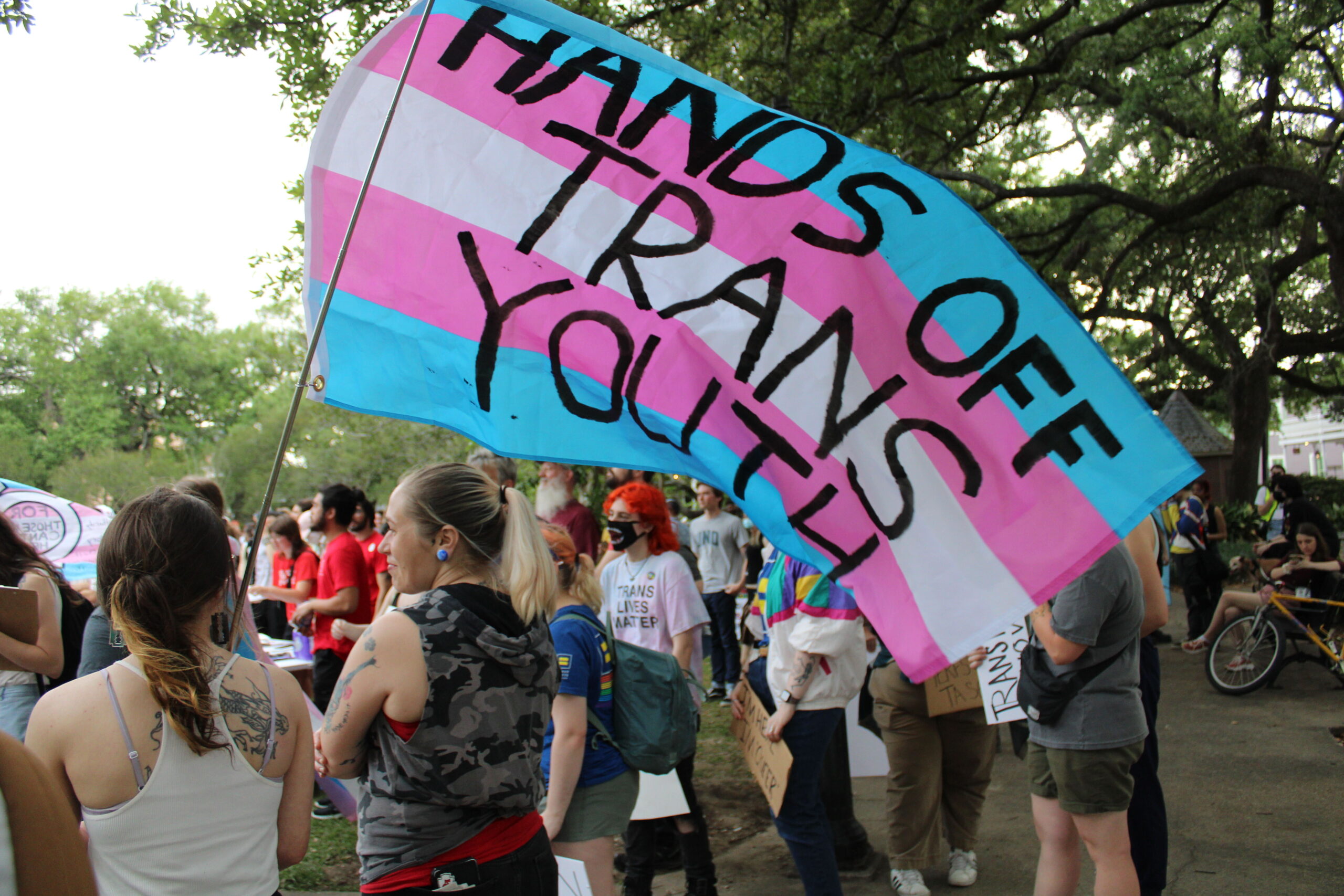
Jeff Walker texted his daughter Harleigh Thursday to tell her that the U.S. 11th Circuit Court of Appeals had allowed Alabama’s ban on gender-affirming care to go into effect.
He received a “colorful” message in reply.
“She said, ‘What the hell are these people thinking?’” he said.
Transgender youth, their families and those who work with them met the two-page order – which had no opinion attached – with anger as they tried to figure out its impact.
Allison Scott, director of impact and innovation at the Campaign for Southern Equality, based in Asheville, said Friday it contributed to a mounting feeling that politicians want to legislate LGBTQ+ people out of existence.
“They want us to go away, they want us to disappear,” she said. “And to me, that’s even more evil and cruel than saying that you would want me to move. It’s saying that you don’t want me to exist.”
The court’s ruling allows enforcement of a law passed in 2022 that makes it a felony for physicians in Alabama to prescribe puberty blockers and hormones to transgender children. A doctor who does so could face up to 10 years in prison.
‘Everyone knew this could happen at any time’
The law targets an exceptionally small number of people. According to the Williams Institute housed at UCLA School of Law, only around 1% of Alabamians aged 13-17 are transgender.
Families with transgender children sued to block the law shortly after its passage, saying the medications were critical to their children’s well-being. U.S. District Judge Liles C. Burke, a Trump appointee, blocked the law in May 2022, ruling that it unconstitutionally interfered with a parent’s ability to make decisions for their children.
But a three-judge panel of the 11th Circuit overruled Burke last August. U.S. Circuit Judge Barbara Lagoa, citing the U.S. Supreme Court’s decision in Dobbs v. Jackson’s Women’s Health Organization, which struck down federal abortion rights protections, wrote that there was no “fundamental right” for parents to access the medication.
Dr. Morissa Ladinsky, a clinician at UAB who works with transgender youth, said the “one sentence suddenness” of Thursday’s order was shocking, but not the decision itself.
“Everyone knew this could happen at any time,” she said.
Ladinksy said they are planning to support their families and will continue to provide all of the health care that they legally are able to provide, such as mental and behavioral counseling.
“We’re continuing to blanket our families,” she said.
Scott said the ruling could wipe out transgender care for years to come. Providers may shut down operations until they can get legal guidance and may never start again.
“And that is part of the way these laws are written and that’s what we’ve been seeing in state after state that’s passing these,” she said.
Attorneys for the families who sued to block the law said they would continue to fight. Jennifer Levi, senior director of Transgender and Queer Rights at GLBTQ Legal Advocates & Defenders (GLAD), who is representing families in the case, said Thursday that the decision was unexpected and disappointing. She said the case is still set for trial in August.
“I do feel hopeful that in the long run, this decision will be ultimately reversed and hopefully parents can get the support that they need,” she said.
A long-term impact
Harleigh Walker is going to graduate from Auburn City Schools in 2025, and her father said that she is not planning to stay in Alabama or any state with similar laws. Walker has a GPA of over 4.0 and is involved in debate.
Until recently, Jeff Walker said that the school has mostly ignored her, which has been his preference. A few months ago, the school began enforcing another 2022 law which restricts bathroom use to the one that corresponds to the sex on their birth certificate.
Harleigh Walker needs to go to the first floor of the Auburn High School for a gender neutral bathroom, when most of her classes are on the second and third floors. Her dad said she’s stopped going to the bathroom at the school.
“There’s health issues around this and it’s really upsetting,” he said.
Messages seeking comment were sent to Auburn City Schools on Friday.
Walker said that Alabama lawmakers have defended parents’ rights when it comes to things like masks and vaccines, but the politicization around transgender kids have led to lawmakers trying to take away his rights.
Beyond college two years away, Jeff Walker said that they are trying to understand their next steps as a family. He said his son called him last night and asked if they were going to move.
“Even he is concerned about his future in the state and what it means for him as it relates to his sister’s healthcare,” he said.
Walker said they will continue her care.
Corey Harvard, executive director of Prism United in Mobile, wrote in an email that they work with families in southwest Alabama. Some are exploring possibly leaving the state for care.
“We want the broader LGBTQ community and their loved ones to know that they aren’t alone,” he wrote. “There are so many individuals and organizations on the front lines and behind the scenes organizing, cultivating community, developing supportive resources, and working to change the cultural climate. The immediate horizon may feel scary, but we believe—and history backs this up—that there is a better future ahead of us.”
Harvard also quoted Martin Luther King, Jr.: “The arc of the moral universe is long, but it bends towards justice.”
Prism United and other Alabama organizations are working with the Campaign for Southern Equality to launch the Southern Trans Youth Emergency Project, a regional effort to provide support to families including through grants and patient navigation support.
‘Disillusioned’
Others expressed disgust with the officials who voted to take their children’s health care away. Cardelia Howell-Diamond, a parent to two transgender children aged 19 and 15, said she was upset by what she called the hypocrisy of Alabama politics.
“I’ve been disillusioned of the fact that the legislators were working for me anyways,” she said.
Howell-Diamond’s hope is to keep her child alive for the next four years. Her family has lived in the state for 11 years, over half of all of her children’s lives. Their neighbors are supportive. Her kids have great friends. Her community is great, she says, but not the politics.
“Their everyday life is amazing,” she said. “They have very supportive friends, teachers, a supportive church — they’re doing great. But when it’s time to get a driver’s license and oh, no, there’s a big tailspin because how do I get a driver’s license with the right gender marker on it in Alabama?”
Howell-Diamond said they can’t leave the state and their other family is in Texas, which isn’t much better, which has a similar law.
She said she dreams of an Alabama similar to the one of today, but where today’s politicians would be gone and replaced by people who “would study things and get to know people that their laws affect.”
She said she dreamed of her neighbors being her lawmakers.
“People who knew us, people who cared about kids who are trans and gender questioning and all of those things and really wanted to nurture and protect those kids, as opposed to being worried about those kids being like viruses.”



